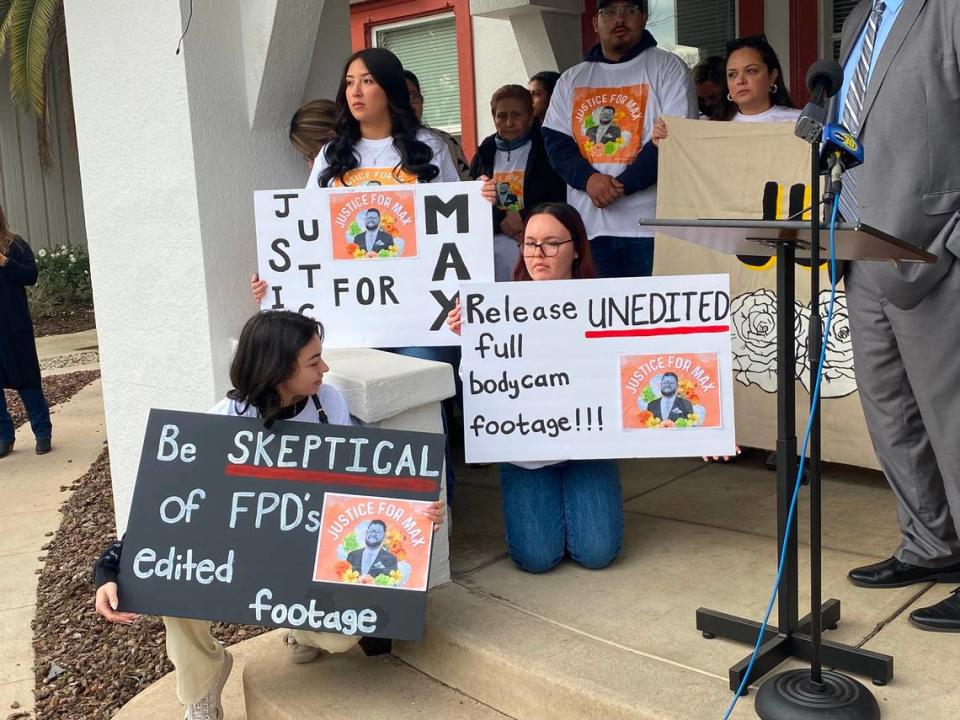Fresno police kill man having a breakdown. Where were the mental health experts? | Opinion
The Fresno Police Department has more officers (860, aiming for 900) and receives more funding ($261.6 million in the current budget) than during any time in its history.
Including $1.2 million for a mental health triage program designed so that behavioral health experts — rather than armed police — would respond to mental-health related incidents.
Yet none of those resources prevented the senseless death of 33-year-old Maximiliano “Max” Sosa Jr., fatally shot by police Nov. 4 just outside his estranged wife’s northwest Fresno apartment.
Sosa was clearly having a bad day, as evidenced by body cam video footage that shows him asking police officers, repeatedly, “Have you shot anybody before?” while wielding kitchen shears. And telling officers the encounter won’t end without them killing him, or Sosa killing a romantic rival or one of them.
“This doesn’t end well,” Sosa said at one point.
Opinion
“My fate is sealed,” he declared at another.
Still, the 2008 Sanger High grad with no criminal record did not deserve to die. His is a tragic but textbook example of why police officers should not be responding to calls involving people experiencing a mental health crisis.
Many law enforcement experts believe that as well, including Fresno Police Chief Paco Balderrama. He’s told me so in person as well as made public statements to that effect.
“You’re sending a cop with a gun, a taser and pepper spray to a call where maybe that’s not needed,” Balderrama said last month. “I believe that people in our mental health professional field are better equipped to handle those types of calls.”
Absolutely there are. But where were those better equipped people when Max Sosa needed them most?
Sosa’s family sues
Sosa’s family is suing the Fresno Police Department over his wrongful death. Their attorney, Kevin Little, criticized the “edited and incomplete” video footage released by police for making Sosa appear to look threatening and contended his behavior did not warrant the use of deadly force.
The video is difficult to watch because it depicts a man under extreme emotional distress making irrational statements to police in an agitated state. But Sosa is clear he has no intention to hurt his estranged wife, whom he called “his boys’ mom.”
After being implored to do so by four police officers both inside and outside the apartment, Sosa exits the front door while holding the kitchen shears behind his back in his right hand. The one officer still inside (whose body cam footage is being shown) then appears to Tase Sosa in the leg, which caused him to stumble forward toward three other officers with his head down and right hand tucked against his chest. At that moment the father of two was shot and killed.
“What existed was someone who had for 90 minutes expressed he was having a mental health crisis — that he wanted to die — but had not threatened his estranged spouse, had not physically threatened any officers,” Little said.
The video released by police is equally striking for what it lacks as what it contains. Officers had more than an hour to call for a trained mental health clinician to help deescalate the situation, but failed to do so. They responded to the 911 call and interacted with Sosa completely on their own.
Isn’t Fresno supposed to know better by now? And haven’t city leaders enacted policies to prevent such recurring tragedies?
The answer to both questions is “yes.” Except there’s a gap between government policy and real-world actuality.
Program’s slow roll-out
In May 2022, Mayor Jerry Dyer unveiled a Mental Health Triage and Response Program within the Fresno Police Department and set aside roughly $1.2 million. The move addressed one of the recommendations made the year prior by the city’s Commission on Police Reform.
“This is long overdue,” Dyer said, “and it is time that our police officers no longer respond to mental health type calls in our city unless there is a danger presented to the public.”
However, the program did not get off the ground immediately. The $1.2 million went unspent and transferred to fiscal year 2024. Giving Fresno police, as stated in the city budget, enough time “to develop a response plan and formalize partnerships with outside entities that will foster the most effective alternate response to mental health crisis calls.”
That outside entity is the Fresno County Department of Behavioral Health. Whose Mobile Mental Health and Substance Use Crisis Response Team went live Jan. 1, as mandated by a new state law.
Fresno Mobile Mental Health is its own service, available 24/7 and 365 a year for all county residents, and is focused on support for mental health and substance abuse crises, rather than intervention. More information is available by calling (559) 600-6000 or at fresnomobilecrisis.com.
For calls where weapons are involved, the county maintains a separate Crisis Intervention Team that includes law enforcement and a clinician. The partnership with FPD was approved in 2018.
It’s unclear why officers didn’t summon a trained behavioral health expert during their encounter with Sosa. As a result of their inaction, a 33-year-old father is dead, a family is in mourning and city taxpayers are probably on the hook for another multimillion-dollar lawsuit settlement.
Same ol’ same ol’ in Fresno. Even when we know better and have done something about it. Supposedly.



